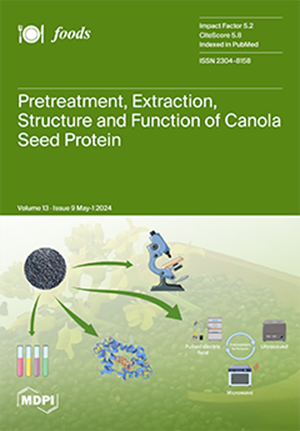乳制品生产中精神营养细菌检测与控制的最新进展:确保牛奶质量
IF 4.7
2区 农林科学
Q1 FOOD SCIENCE & TECHNOLOGY
引用次数: 0
摘要
牛奶是微生物生长的理想环境,尤其是精神营养性细菌,它们能在低温条件下生存并产生耐热酶。精神营养性细菌会造成牛奶质量和安全的严重问题。牛奶可能受到精神营养性细菌污染的几种途径包括动物健康、牛舍卫生、水质、饲喂策略以及牛奶收集、加工等。保持原奶质量对乳品加工至关重要,而乳品行业仍受到市场加工产品过早变质的影响。本综述侧重于精神滋养型细菌的最新检测和控制策略,并强调了先进传感方法对早期检测的重要意义。综述强调了这些微生物给乳制品行业带来的持续挑战,并讨论了通过创新的快速检测方法和严格的加工控制来提高牛奶质量的未来前景。本综述主张转向更先进的牧场检测技术和改进的控制方法,以防止乳制品行业的腐败和经济损失。本文章由计算机程序翻译,如有差异,请以英文原文为准。
Recent Development in Detection and Control of Psychrotrophic Bacteria in Dairy Production: Ensuring Milk Quality
Milk is an ideal environment for the growth of microorganisms, especially psychrotrophic bacteria, which can survive under cold conditions and produce heat-resistant enzymes. Psychrotrophic bacteria create the great problem of spoiling milk quality and safety. Several ways that milk might get contaminated by psychrotrophic bacteria include animal health, cowshed hygiene, water quality, feeding strategy, as well as milk collection, processing, etc. Maintaining the quality of raw milk is critically essential in dairy processing, and the dairy sector is still affected by the premature milk deterioration of market-processed products. This review focused on the recent detection and control strategies of psychrotrophic bacteria and emphasizes the significance of advanced sensing methods for early detection. It highlights the ongoing challenges in the dairy industry caused by these microorganisms and discusses future perspectives in enhancing milk quality through innovative rapid detection methods and stringent processing controls. This review advocates for a shift towards more sophisticated on-farm detection technologies and improved control practices to prevent spoilage and economic losses in the dairy sector.
求助全文
通过发布文献求助,成功后即可免费获取论文全文。
去求助
来源期刊

Foods
Immunology and Microbiology-Microbiology
CiteScore
7.40
自引率
15.40%
发文量
3516
审稿时长
15.83 days
期刊介绍:
Foods (ISSN 2304-8158) is an international, peer-reviewed scientific open access journal which provides an advanced forum for studies related to all aspects of food research. It publishes reviews, regular research papers and short communications. Our aim is to encourage scientists, researchers, and other food professionals to publish their experimental and theoretical results in as much detail as possible or share their knowledge with as much readers unlimitedly as possible. There is no restriction on the length of the papers. The full experimental details must be provided so that the results can be reproduced. There are, in addition, unique features of this journal:
manuscripts regarding research proposals and research ideas will be particularly welcomed
electronic files or software regarding the full details of the calculation and experimental procedure, if unable to be published in a normal way, can be deposited as supplementary material
we also accept manuscripts communicating to a broader audience with regard to research projects financed with public funds
 求助内容:
求助内容: 应助结果提醒方式:
应助结果提醒方式:


